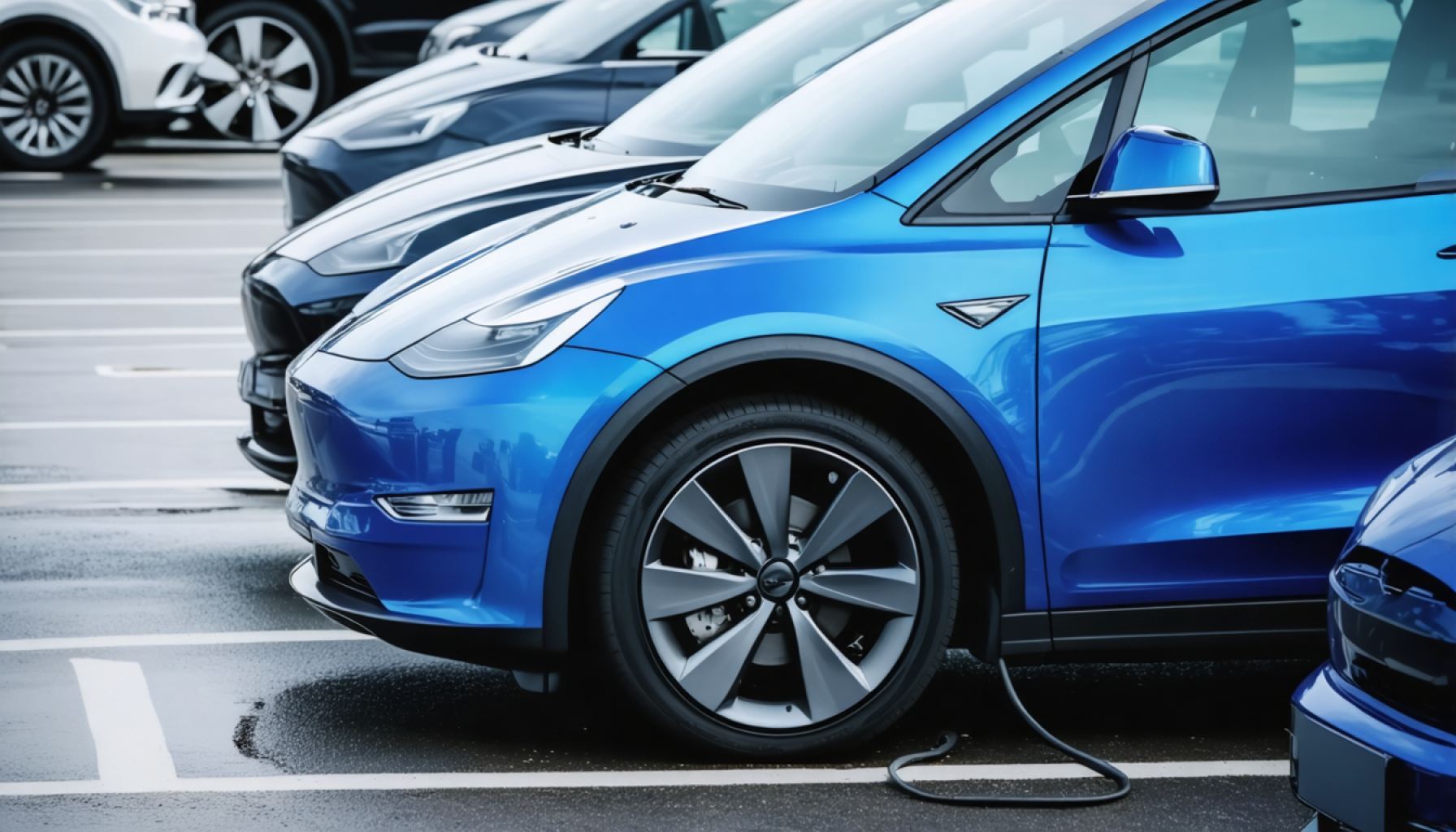- The US imposed new 34% tariffs on Chinese imports, escalating to a total of 54%, prompting a similar Chinese retaliatory tariff.
- The move has significantly impacted the electric vehicle sector; stocks like BYD, Nio, Xpeng, and Li Auto saw steep declines of over 10%.
- This tariff conflict highlights the vulnerability of globalized industries, such as EVs, to nationalistic economic policies.
- Financial experts and investors are urged to reconsider their strategies amid evolving trade tensions and geopolitical shifts.
- China’s call for the US to amend its tariff approach underscores the need for cooperative dialogue to prevent further economic disruptions.
- The situation highlights the interplay between geopolitical strategies and market stability, crucial for future trade dynamics.
- Resilience and strategic foresight become vital for policymakers and industry leaders navigating these challenges.
A series of fresh economic tremors rippled through the financial markets today, set in motion by a storm of new tariffs from the United States. Donald Trump’s announcement of unexpectedly harsh reciprocal tariffs has generated a swift response from China, sending stocks in the electric vehicle sector into a tailspin.
The electric vehicle (EV) revolution, led by companies like BYD, Nio, Xpeng, and Li Auto, symbolizes the future of sustainable transportation. Yet today, these giants faced a formidable obstacle. In the bustling financial hub of Hong Kong, a wave of anxious selling engulfed these stocks, marking a steep decline; BYD plummeted by 11.15 percent, Nio by 11.30 percent, Xpeng by 11.40 percent, and Li Auto by a close 10.82 percent.
Trump’s dramatic policy change entailed an additional 34 percent tariff on imports from China, layering on top of previous tariffs to form a burdensome 54 percent levy. In a mirror response, China wielded its own economic weapon: a matching 34 percent tariff on American imports, effective imminently. The economic might of both nations is on display, locked in a tit-for-tat struggle that threatens to reshape global trade dynamics.
This latest iteration of economic brinkmanship comes with significant implications. As observed in historical trade tensions from 2018 to 2019, the performance of China’s markets is predominantly shaped by its domestic policies and economic strategies. The current political climate, however, demands a reevaluation from investors worldwide, as noted by the China International Capital Corporation (CICC). There’s a palpable anticipation that the global valuation system might pivot, heavily influenced by recent geopolitical developments.
Beyond the numbers, this unfolding scenario underscores a stark reality: nationalistic policies have the power to disrupt globalized sectors, and these large-scale economic skirmishes can derail industries’ growth paths in the blink of an eye. The EV sector, emblematic of progress and innovation, is not immune to these political and economic forces.
As nations navigate these trade tensions, a clarion call is needed for cooperative dialogue. China’s immediate response urged the United States to correct its path, emphasizing that it will fiercely defend its economic interests. The world watches closely, aware that such decisions echo far beyond financial capitals, impacting economies, industries, and ultimately, consumers globally.
In this cauldron of uncertainty, the takeaway is clear: as electric vehicle companies navigate these choppy waters, the undercurrent of geopolitical maneuvering signals a pivotal moment in international trade relations—one that demands resilience and strategic foresight from policymakers and industry leaders alike.
New Tariff Shocks Shake EV Markets: What’s Next for Global Trade?
Understanding the Trade Impact on the EV Sector
The recent imposition of harsh tariffs by the United States and the subsequent reciprocal actions by China have sent shockwaves through the financial markets, particularly affecting the electric vehicle (EV) sector. While the source article has highlighted the immediate market impacts, several other dimensions require exploration to provide a comprehensive picture.
Additional Facts and Insights
1. Historical Context and Lessons:
– The 2018-2019 US-China trade war provides a valuable historical precedent. During that period, both nations imposed tariffs on billions of dollars’ worth of each other’s goods, which led to disruptions in supply chains and fluctuations in global markets. These lessons underscore the potential long-term effects on industries reliant on cross-border trade.
2. Supply Chain Vulnerabilities:
– The EV industry is heavily dependent on complex global supply chains. Key components such as batteries, semiconductors, and rare earth elements are often sourced internationally. Tariffs increase costs and can lead to disruptions, prompting manufacturers to consider supply chain diversification or relocation.
3. Market Forecasts and Industry Trends:
– The global EV market is projected to reach $802.81 billion by 2027, growing at a CAGR of 22.6% from 2021 to 2027 (Allied Market Research). However, trade tensions could slow this growth by increasing production costs and consumer prices, potentially suppressing demand.
4. Policy Recommendations and Strategic Planning:
– Companies should consider hedging against currency and commodity risks. Building strategic reserves of critical components or increasing collaborations with local suppliers can mitigate some of the impacts of tariff-induced price fluctuations.
5. Real-World Use Cases and Life Hacks:
– Consumers looking to purchase EVs during such periods might consider buying sooner rather than later to avoid potential price hikes from newly imposed tariffs. Additionally, exploring government incentives and subsidies can provide financial relief.
Pros and Cons Overview
Pros:
– Encourages manufacturers to localize production, potentially revitalizing domestic industries.
– Can lead to innovative solutions for minimizing costs and maximizing efficiency.
Cons:
– Higher prices for consumers as costs are often passed down the supply chain.
– Increased operational costs for companies, potentially leading to downsizing or reduced R&D investment.
Key Questions and Answers
How will the tariffs affect global EV adoption?
Higher tariffs increase production and retail costs, potentially slowing down the adoption rate as electric vehicles become less competitive against traditional internal combustion engine vehicles in terms of pricing.
Are there sustainable solutions to counter tariff impacts?
Diversifying the supply chain and investing in local production facilities can reduce reliance on international components. Additionally, fostering closer ties with policy-makers could help alleviate some pressures through negotiations and policy adjustments.
What to watch for next in global trade relations?
Monitor upcoming trade negotiations between the US and China. Watch for policy shifts, tariff adjustments, and announcements from major EV manufacturers about strategic changes in response to these developments.
Conclusion and Quick Tips
Amid rising tariffs and economic uncertainty, investors and industry players need to stay informed and agile. Regularly reviewing market trends and adjusting strategies accordingly is paramount. Consumers should be vigilant about price changes and consider timing their purchases strategically to avoid fiscal repercussions. Cooperation between nations remains critical to mitigating these challenges while continuing the path toward sustainable transportation.
For more insights on sustainable transportation and international trade, visit Allied Market Research.











